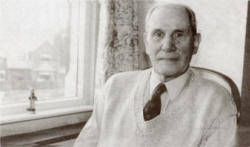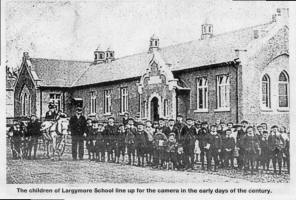
BILLY ELDER HAS FOND MEMORIES OF YESTERYEAR
 BILLY
Elder was only five years old when he moved with his family from Dublin to come
to the 'prosperous' new province of Northern Ireland.
BILLY
Elder was only five years old when he moved with his family from Dublin to come
to the 'prosperous' new province of Northern Ireland.
It was just a few years after the Easter Rising of 1916 and there was still trouble in Ireland's capital, where poverty was rife and work scarce.
Billy's father took his family across the border in 1922 during the time of partition, to a place filled with promises of a better life ahead.
Billy remembers the journey well, as the family of six travelled north in a lorry. They were stopped by a friendly B Special who welcomed them to Lisburn at Moores Bridge.
The family acquired a house on the Ballynahinch Road which was filled with oil lamps and considerable love and happiness.
 Billy's
education soon began at Sloan Street Primary School, where he came under the
tutelage of teachers Miss Coulter and Miss Torrens. They would often send young
Billy to the shop to get their lunch and asked him to fetch coal for the fire in
the school.
Billy's
education soon began at Sloan Street Primary School, where he came under the
tutelage of teachers Miss Coulter and Miss Torrens. They would often send young
Billy to the shop to get their lunch and asked him to fetch coal for the fire in
the school.
"I liked school," said Billy. "It was a place with no complications.
"I remember having to write with chalks and slates and learning your ABCs."
At the age of just 14 Billy tried to leave school, but because of a job scarcity he stayed on for another year to help the teacher with the younger classes.
When he eventually left school at 15, he obtained a job on Scott's milk van, and then went to work in a farm in Dromore. He had to cycle 16 miles every day, leaving his home at 6.30am six days a week. Far his hard work he received 12 shillings pay.
His father, an engineer by trade, was offered a job in Sligo when Billy was young and because of the lack of jobs in the area at the time, decided to take it.
He returned home at Christmas and Easter, while Billy's mother visited his father once a month.
His mother relied on Billy and his other brother to be the men of the house.
Cycling
In his spare time Billy often did a full day's work before cycling with his friends to Newcastle, or to some other seaside rests around the Province.
"We never thought anything of cycling that far," said Billy.
"Everyone had a bike. Sometimes today people tend to be a bit lazy and would never dream of having to cycle 30-odd miles to see the sea. But we loved it."
He often also attended the local dances where he met his wife, Eleanor Downey.
Billy had been courting her on and off for sometime but the relationship ran into trouble. Eleanor's_ mother did not want Billy to associate with her daughter and to try and end the relationship, she sent Billy a letter pretending to be Eleanor saying she didn't want to have anything to do with him. .
Before Eleanor's mother died she confessed to her sons who told Billy what happened. Billy and Eleanor met up again and married a few years later in 1941 at Magheragall Church. .
He
had always wanted to follow in his father's footsteps and decided to go and do
engineering at the local technical college.
"The interest in engineering never left me," said Billy.
Work
"Work was not always plentiful. But if you were not working you would go and just get another job. No‑one would have dreamt of getting social benefits. I never had to go on the dole in my life.
"If I left one job on Friday I got another by the Monday morning. You may not have liked it but it was a job."
During his life he had a host of jobs at what seems like every company in Lisburn. He worked at Smyth Patterson's, Jefferson's, Barbour Threads and enjoyed 25 years as a foreman at Farrans.
Eleanor and Billy spent a contented life together until she died after a short illness two decades later. He later got married Sarah Stewart and the couple have lived at Beechdene Drive ever since.
Looking ahead to the the Millennium, Billy wants people to enjoy and revel in their happiness.
"I do host whatever else the Millennium brings it stings happiness and there is no longer bitterness and fighting," he added.
"I hope future will be filled with good honest people and I would not want to see people becoming more and more wrapped up in themselves."